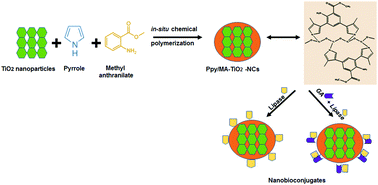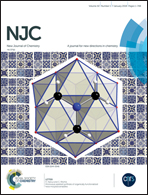A polypyrrole–methyl anthranilate functionalized worm-like titanium dioxide nanocomposite as an innovative tool for immobilization of lipase: preparation, activity, stability and molecular docking investigations†
Abstract
Enzymatic biocatalysis has a vast reputation on an industrial scale. The major hindrance faced by enzymes is their denaturation under various conditions. In this study, we report that the activity and stability of enzymes can be enhanced by their immobilization on a novel synthesized polypyrrole–methyl anthranilate-titanium oxide nanocomposite containing amine groups. We demonstrated this by successfully immobilizing lipase from Rhizopus oryzae on a Ppy–MA/TiO2 NC by physical adsorption and a glutaraldehyde-activated covalent coupling procedure. The catalytic efficiencies of the free and immobilized preparations were determined for the hydrolysis of p-nitrophenyl palmitate. The covalently immobilized lipase displayed a significantly higher activity yield (effectiveness factor of 0.97) in comparison with the adsorbed counterpart (effectiveness factor of 0.86). The binding of lipase to the Ppy–MA/TiO2 NC was confirmed by transmission electron microscopy, Fourier transform infrared spectroscopy and scanning electron microscopy. TGA and DTA were performed to investigate the thermal stability of the synthesised biocatalysts. The storage stability, solvent tolerance, and reusability of the resulting nanobiocatalyst and the effect of pH and temperature on its catalytic activities were also investigated. The prepared nanobiocatalysts displayed remarkably improved activity in terms of solvent tolerance (activity recovery of 150% and 125% in acetone and isopropanol, respectively) in comparison with its free counterpart. We envisage that the covalent binding method played a profound role in enhancing the properties of the enzyme immobilized on the Ppy–MA/TiO2 NC. In view of the abovementioned results, a hydrolytic enzyme immobilized on this functionalized TiO2 nanocarrier can be used as a stable and effective nanobiocatalyst with vital implications for industrial biotechnology.



 Please wait while we load your content...
Please wait while we load your content...